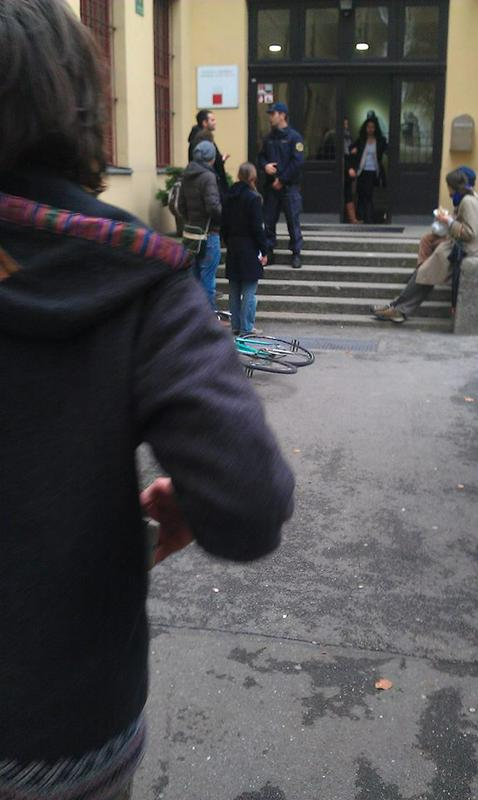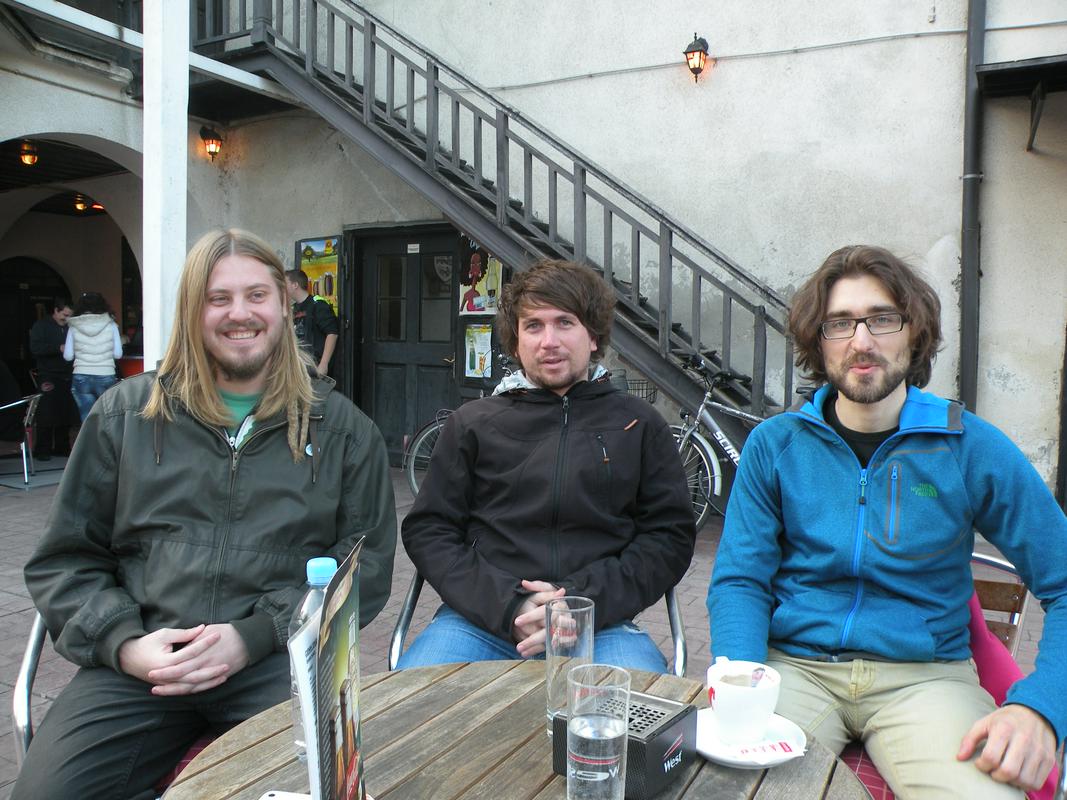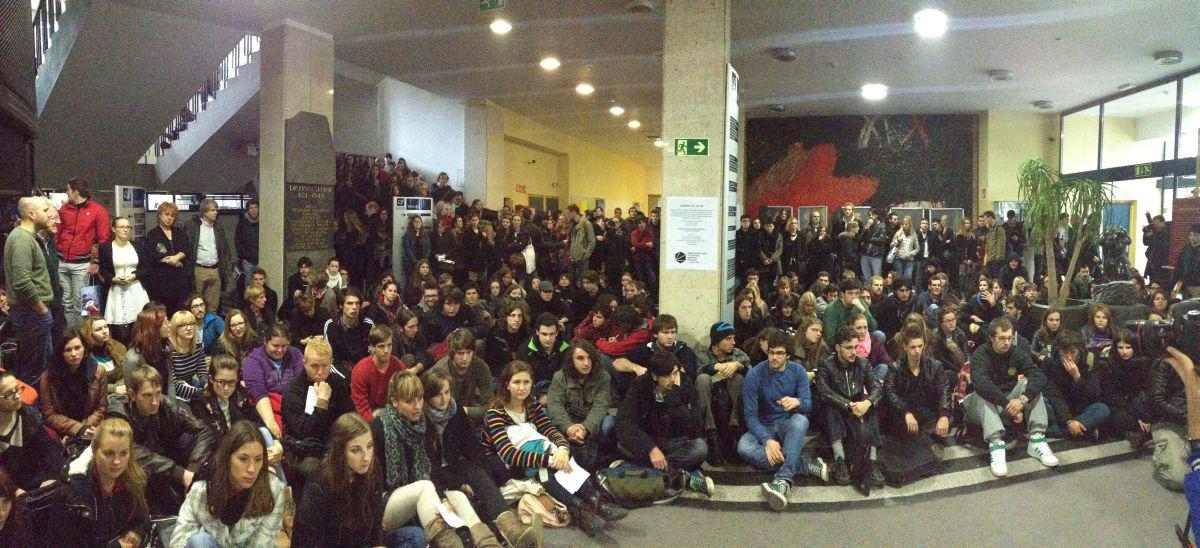We will persist until the matter is not written in law. We also have to point out that it's not just about the introduction of tuition fees for the first and second Bologna levels, but also about the aspirations to commercialize studies and subject knowledge to the open market. The proposed act has an inherent tendency to subject knowledge and our higher education to the economy. With that we're crumbling the autonomy of the universities.

The Chancellor's stand on the issue openly speaks in favour of a marketing logics university. The difficulty there is that the production of knowledge becomes a production of excess value. Knowledge itself loses its core basis, because it's being produced for the sole reason of being produced. And you begin to produce only specific knowledge and competence and not general knowledge. And so universities lose their primary function.

The Iskra student movement was established last summer and stems from the protests in front of the Ljubljana Stock Exchange. Students from the Faculty of Arts joined the group and created a self-organized student movement. According to members of the movement it is the only way to include the young in decision-making processes.
"By learning from organizational mistakes in the past we tried to create a different kind of organization. One that would persevere and minimize individual blindness," says Miha Kosi, a representative of Iskra.
Iskra is actively taking part in the public debate for the new Higher Education Act. It demands the preservation of free public education. The movement is also organizing student assemblies at the faculties in Ljubljana, sparking negative reactions from the heads of the University of Ljubljana.
It seems that Jernej Pikalo, the Minister for Higher Education and Science, was more ready to listen to the students. He received representatives from the movement and promised that public education would remain to be non-commercial. However Iskra members stress that they will not back down until the issue is clearly and undoubtedly settled in writing.
We talked with Iskra members Miha Kosi, a future engineer, Tine Bele, a sociologist and Matej Prijatelj, a physicist, about the current and future activities of the student movement, which tries to prove that young people and especially students are not "passive", and would like to take part in decision-making processes.
Students are often criticized for being too passive. It seems the last time they rebelled the most was against the introduction of the bill on mini jobs. With your activities you're trying to prove the opposite.
Matej Prijatelj: Students would like to be more active. However the whole system - from the state to the universities - aims to mould the individual in a way to make him silent and just keep on studying. We have to fight against that.
Tine Bele: Students are not passive; they just need to be given channels through which they can be heard.
University Chancellor Svetlik is said to have warned, that our faculties are not “competitive on the world market”. According to you, statements like that hide neoliberal trends in our higher education.
Miha Kosi: The whole act is based on the idea of human capital, where knowledge is no longer considered a public good, but a market product. Students are no longer seekers of knowledge, but consumers of the product. That's the ideological foundation behind the proposed law, with which we cannot agree.
Matej Prijatelj: From some of his recent interviews we can also understand that the Chancellor supports the marketing of knowledge and the "Americanizing" of our universities.
Tine Bele: The Chancellor's stand on the issue openly speaks in favour of a marketing logics university. The difficulty there is that the production of knowledge becomes a production of excess value. Knowledge itself loses its core basis, because it's being produced for the sole reason of being produced. And you begin to produce only specific knowledge and competence and not general knowledge. And so universities lose their primary function.
Matej Prijatelj: The matter is maybe even worse. The whole world strives to market things, like for example health, education, pensions... It happens that public institution become market-oriented. We have to be cautious and critical towards this.
Tine Bele: By privatizing public institutions we also indirectly get lower wages. People have to pay for something which was free before.
What are some of the other essential points which would have to be considered when bringing the new Higher Education Act?
Matej Prijatelj: The only aim of this act is to commercialize public education. In the introduction of the act it’s written that education will be a service available on the open market. It's hard to expect that we’ll be able to fundamentally change things. That's why we have to be wary of what's going to happen.
The whole interview in Slovenian language can be found here http://www.rtvslo.si/slovenija/celoten-sistem-od-drzave-do-univerze-skusa-ukalupiti-posameznika-naj-bo-tiho-in-studira/322962
We will persist until the matter is not written in law. We also have to point out that it's not just about the introduction of tuition fees for the first and second Bologna levels, but also about the aspirations to commercialize studies and subject knowledge to the open market. The proposed act has an inherent tendency to subject knowledge and our higher education to the economy. With that we're crumbling the autonomy of the universities.
The Chancellor's stand on the issue openly speaks in favour of a marketing logics university. The difficulty there is that the production of knowledge becomes a production of excess value. Knowledge itself loses its core basis, because it's being produced for the sole reason of being produced. And you begin to produce only specific knowledge and competence and not general knowledge. And so universities lose their primary function.



































































